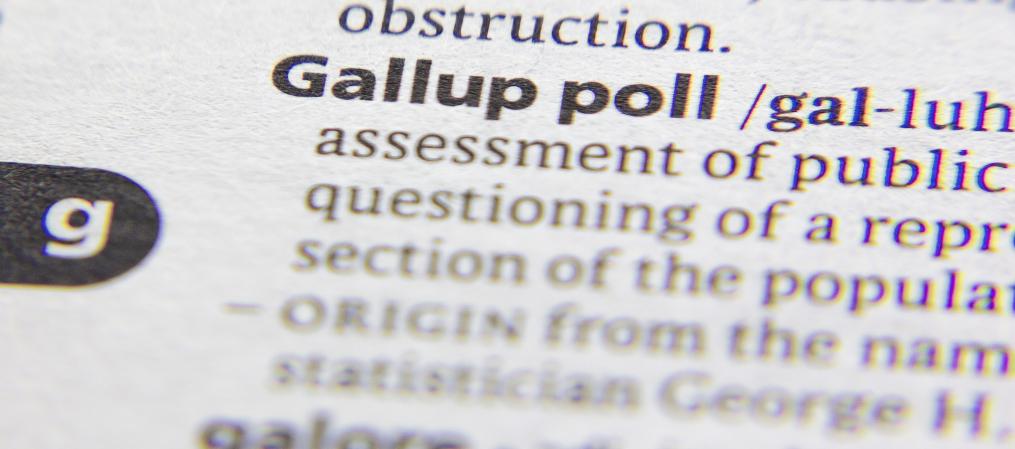U.S. and worldwide public opinion on a wide variety of topics.
A public opinion data source made available to Cornell researchers through CCSS, in conjunction with the Cornell University Libraries that provides access to both aggregate and respondent-level data. Aggregate data is available for economic, social, and well-being indicators from countries that are home to more than 98% of the world's population. Respondent-level data from longstanding surveys such as the Gallup Covid-19 Survey, Gallup Poll Social Series Surveys, Race Relations Survey, Confidence in Institutions Survey, and Honesty and Ethics in Professions Survey are also available. Cornell researchers have used this data to analyze presidential response to public opinion and how it varies depending on the state of the economy and project the 2020 Electoral College winner in the Presidential election of that year, among others. See the Cornell-Authored articles and dissertations below for additional examples of Cornell researchers who have used this data in preparing their publications.
Click on the desired dataset below to access additional documentation through Cornell Box.
Email socialsciences@cornell.edu if you have any questions.
| Dataset | Description | Years Polled | Total Observations | Survey Frequency |
| Gallup Poll Social Series | US views on topics including health, healthcare, crime, governance, work, education, consumption, minority relations, moral values, finance, environment, world affairs, and mood of nations | 2001-2025 | > 265,000 | Monthly |
| COVID-19 and Wellbeing Survey | American attitudes on topics related to the COVID-19 pandemic – including well-being | 2020-2025 | ~ 200,000 | Daily, then Monthly, then Quarterly |
| Confidence in Institutions Survey | Confidence level in various US institutions, such as Congress, Presidency, Supreme Court, Police, and others | 1973-2024 | > 50,000 | Annually |
| Race Relations Poll | Measures of race relations in the US, including satisfaction in how Immigrants and Blacks are treated in the US, perception of the status of race relations, support of affirmative action programs, etc. | 2018 | 6,503 | One-time |
| Honesty and Ethics in Professions Survey | US perceptions of honesty and ethics within various professions, such as doctors, journalists, police officers, etc. | 1976-2024 | 44,553 | Annually |
| Religion Battery | Items focused on religion in the US, such as denomination, religious service attendance, perception of religion's influence in society, etc. | 1999-2024 | > 535,003 | Biannually |
| US Daily Tracking Poll | Survey of US adults about various political, economic, and well-being topics | 2008-2019 | > 3.7 million | Daily |
| Gallup World Poll | Studies from 160+ countries (representing 99% of the world's adult population) tracking issues from food access, employment, leadership performance, well-being, and more. Questions in the World Poll survey can be discovered by creating an account with Gallup’s World Poll Reference Tool. The Reference Tool is not the source of the data itself but instead a search mechanism to discover which questions were asked in specific countries during specific years. You can use this tool to locate variables you’d like to extract. Refer to the World Poll Reference Tool Guidebook for instructions on creating an account and performing searches. | 2006-2025 | > 2 million | Annually |
Citing Gallup Analytics Data
Please use the citation below for any data used from the Gallup Analytics data collection:
Gallup Organization. Gallup Analytics. Catalog no. 2823. Ithaca, NY: Cornell University. Cornell Center for Social Sciences [distributor]. Version 1.
Looking for Additional Public Opinion Data?
Cornell is home to the Roper Center for Public Opinion, which holds public opinion data ranging from the 1930s, when survey research was in its infancy, to the present.
ICPSR holds many polling and survey datasets. CCSS membership provides access to this data for the Cornell community and requires registration. You can create an account here, using your Cornell email address.
As a Cornell affiliate, you may contact us using this form to inquire about other data you are looking for.
Have Additional Questions About This Data?
Please get in touch with us at socialsciences@cornell.edu for assistance.
How Do I Get Cited When I Use Gallup Analytics Data?
Please inform us of your publication that used this data so we can add it to our bibliography of related articles, as seen below.
Christenson, Dino, and Douglas L. Kriner. 2020. "Beyond the Base: Presidents, Partisan Approval, and the Political Economy of Unilateral Action." Journal of Political Institutions and Political Economy 1(1): 79-103 doi:http://dx.doi.org/10.1561/112.00000005.
Enns, Peter K., and Julius Lagodny. 2020. "Forecasting the 2020 Electoral College Winner: The State Presidential Approval/State Economy Model." PS: Political Science & Politics 54(1): 81-85 doi:https://doi.org/10.1017/S1049096520001407.
Enns, Peter K., and Julius Lagodny. 2021. "Using Election Forecasts to Understand the Potential Influence of Campaigns, Media, and the Law in U.S. Presidential Elections." University of Miami Law Review 75(2): 509-546 url:https://repository.law.miami.edu/umlr/vol75/iss2/5.
Hobbs, Will, and Anthony D. Ong. 2023. "For living well, behaviors and circumstances matter just as much as psychological traits." Proceedings of the National Academy of Sciences of the United States of America 120(12). doi:https://doi.org/10.1073/pnas.2212867120.
Lagodny, Julius, Rebekah Jones, Juliana Koch, and Peter K. Enns. 2020. "A Validation and Extension of State-Level Public Policy Mood: 1956–2020." State Politics & Policy Quarterly. 23(4): 1-14 doi:https://doi.org/10.1017/spq.2021.26.

